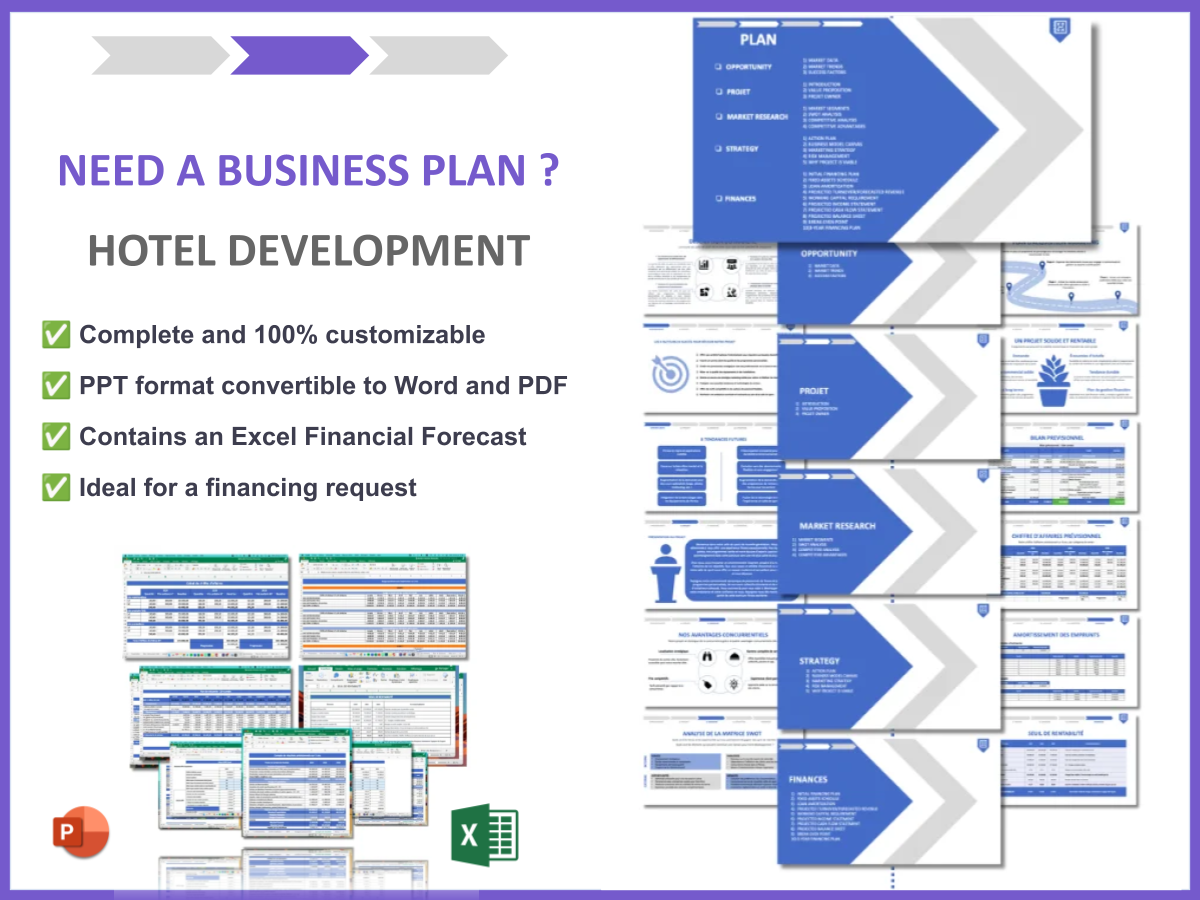Why Should You Have a SWOT Analysis for Hotel Development?
Are you considering entering the hotel development industry? You’re not alone! The hotel sector is booming, and understanding the landscape is crucial. A SWOT analysis is a powerful tool that can guide your decisions and strategies. It stands for Strengths, Weaknesses, Opportunities, and Threats, providing a clear framework for evaluating your business.
Did you know that over 60% of new hotel ventures fail within the first three years? This statistic highlights the importance of thorough planning and evaluation. A SWOT analysis is essential for understanding both the internal and external factors that can impact your success in this competitive market.
A SWOT analysis is a strategic planning technique used to identify and analyze the internal and external factors that can influence the success of a project or business. By conducting a SWOT analysis for your hotel, you can gain insights that lead to better decision-making and more effective strategies.
- Understand your competitive advantages
- Identify potential risks
- Recognize market opportunities
- Improve strategic planning
- Align resources with goals
- Enhance decision-making processes
- Foster team collaboration
- Increase investor confidence
- Adapt to market changes
- Create a roadmap for success
How Do You Write a SWOT Analysis for Hotel Development?
Writing a SWOT analysis for hotel development involves careful consideration of various factors that can influence your project’s success. Let’s break it down into manageable sections to ensure you cover all aspects.
Strengths
First, identify your hotel’s unique selling propositions, such as location, brand reputation, or exclusive amenities. These strengths give you an edge over competitors and can be leveraged in your marketing strategies.
Next, assess operational efficiencies that contribute to your success, like experienced staff or established partnerships. These elements can enhance the overall guest experience and improve your hotel’s performance.
Evaluate your financial stability, including access to funding or investor interest. A solid financial foundation can help you seize opportunities and navigate challenges effectively.
Finally, consider technological advantages that can set your hotel apart, such as advanced booking systems or energy-efficient designs. Staying ahead of the curve in technology can attract tech-savvy guests and reduce operational costs.
Weaknesses
Recognize areas where your hotel may fall short, such as outdated facilities or limited marketing reach. Acknowledging these weaknesses allows you to develop strategies to address them.
Assess staffing challenges, including high turnover rates or skill gaps. Ensuring you have a well-trained and stable workforce is crucial for maintaining service quality.
Evaluate your financial limitations, like debt levels or budget constraints. Understanding these factors can help you make informed decisions about investments and expenditures.
Consider geographical disadvantages, such as being far from tourist attractions or public transport. Identifying these weaknesses can help you strategize on how to mitigate their impact.
Opportunities
Identify emerging trends in the hotel industry, such as eco-tourism or digital nomadism. These trends can open new avenues for growth and marketing.
Assess potential partnerships with local businesses or tourism boards that can enhance your offerings and attract more guests.
Evaluate new market segments, like wellness travel or extended stays. Targeting these segments can diversify your clientele and increase occupancy rates.
Consider technological advancements that can enhance guest experiences, like mobile check-ins or smart room features. Adopting these technologies can significantly improve guest satisfaction.
Threats
Identify competitive pressures from other hotels or alternative accommodations like Airbnb. Understanding your competition is key to staying relevant in the market.
Assess economic factors that could impact travel, such as recessions or pandemics. Being prepared for these scenarios can help you navigate challenges more effectively.
Evaluate regulatory changes affecting the hotel industry, like zoning laws or health regulations. Staying informed about these changes can help you remain compliant and avoid potential pitfalls.
Consider environmental threats, such as climate change or natural disasters. Developing contingency plans for these threats can safeguard your investment and ensure business continuity.
SWOT Example N°1 for Hotel XYZ
This example illustrates how Hotel XYZ utilized a SWOT analysis to streamline operations and enhance its market position.
| SWOT | Analysis |
|---|---|
| Strengths | Prime location, loyal customer base |
| Weaknesses | Limited parking space |
| Opportunities | Expansion into wellness tourism |
| Threats | Competition from new hotels |
- Strong brand recognition
- Excellent customer service
- High occupancy rates
- Opportunities for expansion
Utilizing a SWOT analysis helped Hotel XYZ pinpoint their strengths and identify areas for growth, making them more competitive in the market. By leveraging their prime location and loyal customer base, they could focus on enhancing their marketing strategies while addressing weaknesses like limited parking space.
SWOT Example N°2 for Boutique Hotel ABC
Boutique Hotel ABC offers a unique perspective on the application of a SWOT analysis in the hospitality industry.
| SWOT | Analysis |
|---|---|
| Strengths | Unique design, personalized service |
| Weaknesses | Limited brand awareness |
| Opportunities | Collaborations with local artists |
| Threats | Economic downturn affecting luxury travel |
- Unique selling points
- High guest satisfaction
- Opportunities for local partnerships
- Vulnerability to economic shifts
Boutique Hotel ABC leveraged its unique design as a strength while recognizing that increased marketing could help overcome its weaknesses. By exploring collaborations with local artists, they can enhance their brand awareness and attract more guests, ultimately mitigating the impact of economic downturns on luxury travel.
SWOT Example N°3 for Resort Hotel DEF
Resort Hotel DEF’s SWOT analysis reveals critical insights into their operations and market positioning.
| SWOT | Analysis |
|---|---|
| Strengths | Scenic views, all-inclusive offerings |
| Weaknesses | Seasonal fluctuations in bookings |
| Opportunities | Growth in family travel market |
| Threats | Environmental concerns affecting tourism |
- Attractive all-inclusive packages
- Family-friendly amenities
- Market growth potential
- Seasonal challenges
The SWOT analysis guided Resort Hotel DEF in adapting their offerings to cater to family travelers. By capitalizing on their scenic views and all-inclusive packages, they can attract families while addressing the seasonal fluctuations in bookings through targeted marketing strategies.
SWOT Example N°4 for Luxury Hotel GHI
Luxury Hotel GHI showcases the effectiveness of a comprehensive SWOT analysis in the high-end market.
| SWOT | Analysis |
|---|---|
| Strengths | High-end amenities, strong loyalty program |
| Weaknesses | High operating costs |
| Opportunities | Expansion into international markets |
| Threats | Competition from boutique hotels |
- Established reputation for luxury
- Loyal customer base
- Potential for international growth
- Rising competition
By identifying high operating costs as a weakness, Luxury Hotel GHI can strategize to enhance profitability while maintaining their premium offerings. Their strong loyalty program and established reputation for luxury provide a solid foundation for expanding into international markets, despite the rising competition from boutique hotels.
SWOT Example N°5 for Budget Hotel JKL
Budget Hotel JKL provides a different angle on SWOT analysis applications in the hospitality sector.
| SWOT | Analysis |
|---|---|
| Strengths | Affordable rates, basic amenities |
| Weaknesses | Limited marketing budget |
| Opportunities | Growth in budget travel segment |
| Threats | Price wars with competitors |
- Competitive pricing
- Value-driven customer base
- Opportunities in budget travel
- Risk of price competition
Budget Hotel JKL’s SWOT analysis emphasizes the need for creative marketing strategies to highlight their value proposition amidst competitive pressures. By leveraging their affordable rates, they can attract a value-driven customer base while addressing the risks associated with price wars in the market.
SWOT Example N°6 for Eco-Friendly Hotel MNO
Eco-Friendly Hotel MNO illustrates a modern approach to SWOT analysis in the hospitality industry.
| SWOT | Analysis |
|---|---|
| Strengths | Sustainability initiatives, eco-certifications |
| Weaknesses | Higher costs for sustainable materials |
| Opportunities | Rising demand for eco-tourism |
| Threats | Greenwashing accusations |
- Strong sustainability focus
- Growing eco-conscious clientele
- Potential for educational partnerships
- Risks associated with greenwashing
Eco-Friendly Hotel MNO’s commitment to sustainability is both a strength and a potential threat, necessitating transparent practices. Their SWOT analysis reveals that while higher costs for sustainable materials may impact profitability, the rising demand for eco-tourism offers significant growth opportunities.
SWOT Example N°7 for Urban Hotel PQR
Urban Hotel PQR showcases the urban experience through a comprehensive SWOT analysis.
| SWOT | Analysis |
|---|---|
| Strengths | Prime city location, trendy decor |
| Weaknesses | High noise levels |
| Opportunities | Partnerships with local attractions |
| Threats | Urban crime rates affecting safety |
- Desirable location
- Unique ambiance
- Local partnerships
- Safety concerns
Urban Hotel PQR’s SWOT analysis highlights the importance of addressing noise levels to enhance guest experiences. By leveraging their prime city location and trendy decor, they can create unique offerings that attract urban travelers while being mindful of safety concerns that may arise from urban crime rates.
SWOT Example N°8 for Family Resort STU
Family Resort STU leverages its unique position in the market through a detailed SWOT analysis.
| SWOT | Analysis |
|---|---|
| Strengths | Family-friendly activities, spacious accommodations |
| Weaknesses | Limited adult-focused amenities |
| Opportunities | Expansion into family packages |
| Threats | Economic downturn affecting family budgets |
- Family-centric offerings
- Spacious facilities
- Growth in family travel
- Vulnerability to economic shifts
Family Resort STU’s SWOT analysis allows them to create targeted marketing strategies to attract family travelers. By enhancing their family-centric offerings and spacious facilities, they can capitalize on the growth in family travel while being aware of the potential vulnerability to economic shifts that may impact family budgets.
SWOT Example N°9 for Historic Hotel VWX
Historic Hotel VWX emphasizes heritage through its SWOT analysis, showcasing its unique market position.
| SWOT | Analysis |
|---|---|
| Strengths | Rich history, unique architecture |
| Weaknesses | Maintenance costs |
| Opportunities | Cultural tourism growth |
| Threats | Modern hotel competition |
- Unique historical value
- Cultural significance
- Market growth potential
- Competition from modern hotels
Historic Hotel VWX can capitalize on its rich history and unique architecture as key strengths in its SWOT analysis. By promoting its cultural significance, the hotel can attract niche markets interested in cultural tourism, while also addressing the challenges posed by competition from modern hotels.
SWOT Example N°10 for Conference Center Hotel YZ
Conference Center Hotel YZ demonstrates the impact of a SWOT analysis in the corporate sector.
| SWOT | Analysis |
|---|---|
| Strengths | Large event spaces, business amenities |
| Weaknesses | Limited leisure facilities |
| Opportunities | Growth in corporate events |
| Threats | Competition from dedicated event spaces |
- Strong corporate focus
- Large capacity for events
- Opportunities in corporate partnerships
- Competition from specialized venues
Conference Center Hotel YZ’s SWOT analysis helps in identifying ways to enhance their offerings for corporate clients. Their large event spaces and strong corporate focus provide a solid foundation for attracting business events, despite the competition from specialized venues that cater exclusively to corporate needs.
Conclusion
In conclusion, conducting a SWOT analysis for hotel development is essential for strategic planning and risk management. By understanding your strengths, weaknesses, opportunities, and threats, you can make informed decisions that lead to success in the competitive hotel industry. To help you get started on your journey, consider utilizing a comprehensive business plan template for Hotel Development that can provide the structure you need.
Additionally, if you’re interested in more insights, check out our articles on How to Establish a Hotel Development Business? and How to Plan a Hotel Development Marketing Strategy? With Example. These resources will equip you with the knowledge to navigate the complexities of the hotel industry effectively.
Frequently Asked Questions
1. What is a SWOT analysis?
A SWOT analysis is a strategic planning tool that helps businesses identify their Strengths, Weaknesses, Opportunities, and Threats related to their operations.
2. Why is a SWOT analysis important for hotel development?
It helps hotel developers understand the market landscape and make informed decisions to enhance their success.
3. How often should a SWOT analysis be conducted?
Regularly, especially when entering new markets or after significant changes in the hospitality industry.
4. What factors should be considered in a hotel SWOT analysis?
Consider internal factors like resources and capabilities, and external factors like market trends and competition in the hotel industry.
5. Can a SWOT analysis help in securing funding?
Yes, a well-structured SWOT analysis can demonstrate to investors that you have a clear understanding of your business environment.
6. What are some common weaknesses identified in hotel SWOT analyses?
Common weaknesses include high operational costs, limited marketing reach, and outdated facilities.
7. How can threats be mitigated in hotel development?
By regularly reviewing the SWOT analysis and adjusting strategies to address identified threats.
8. What opportunities can arise in the hotel industry?
Emerging trends like eco-tourism, digital nomadism, and the rise of experiential travel can create new opportunities.
9. Is a SWOT analysis useful for existing hotels?
Absolutely! Existing hotels can benefit from regular SWOT analyses to adapt to changing market conditions.
10. How can technology impact a hotel’s SWOT analysis?
Technology can enhance strengths (like operational efficiency) and present threats (like competition from online booking platforms).







